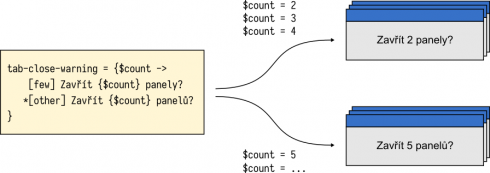
Mozilla launched the first full release of its Fluent localization file specification today and has put a call out to developers behind translation tools to take the release for a test run. Fluent comprises “localization specifications, implementations and good practices,” Mozilla localization specialist Staś Małolepszy wrote in the announcement.
The main focus of Fluent is asymmetric localization, which accounts not only for word meaning, but also for differences in grammar, style and context by making sure that the source language takes a simple form.
“We make it possible to cater to the grammar and style of other languages, independently of the source language,” Małolepszy wrote. “All of this happens in isolation; the fact that one language benefits from more advanced logic doesn’t require any other localization to apply it. Each localization is in control of how complex the translation becomes.”
Małolepsz provided the example of tailoring Czech translations to account for multiple different plural forms.
“At first glance, Fluent looks similar to other localization solutions that allow translations to use plurals and grammatical genders,” Małolepszy wrote. “What sets Fluent apart is the holistic approach to localization. Fluent takes these ideas further by defining the syntax for the entire text file in which multiple translations can be stored, and by allowing messages to reference other messages.”
The tool features a flexible phrasing system which will allow frequently used phrases to be referenced from multiple translation files, ensuring consistency, Małolepszy wrote.
Additionally, Mozilla announced the stable release of the Fluent Syntax, the file format and specification for Fluent translations, alongside beta releases of JavaScript, Python and Rust parser implementations.






